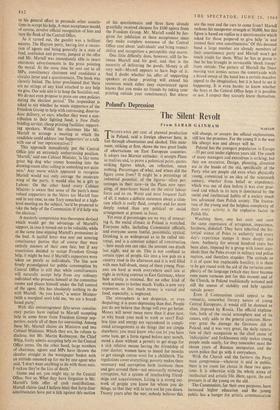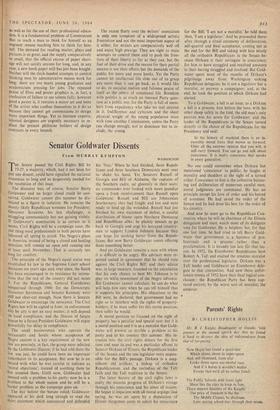Poland's Depression
The Silent Revolt
From SARAH GAINHAM
TWENTY-FIVE per cent of planned production in Poland, said a foreign observer here, is lost through absenteeism and alcohol. This state- ment, striking at first, shows the two great faults of observations on East European countries. It adopts two Marxist attitudes: it accepts Plans as realities and, to prove a polemical point, quotes striking figures which, on reflection, mean nothing. Percentages of what, and where did the figure come from? It might be a percentage of industrial potential, of the figures—often per- centages in their turn—in the Plans now oper- ating, of man-hours based on the entire labour force and so on. Worst and most frequent fault of all, it makes a definite statement about a situa- tion which is really fluid, complex and far more deeply rooted than any political or social arrangement at present in force.
Yet even if percentages are no way of measur- ing it, the social climate in Poland is wretched. Everyone talks, including Communist officials, and everyone seems fretful, pessimistic, cynical. Drinking is so widespread as to be called uni- versal. and is a constant subject of conversation —how much one can take, the amount one drank last night, and so on. This is not confined to certain types of people. Go into a low pub on a country road in the afternoon and it is well filled with men half-drunk, many of them young. Peas- ants are hard at work everywhere until late at night in striking contrast to East Germany, where field activity is minimal. But no other kind of worker seems to bother much. VOdka is now very expensive, so that much money is wasted and food, especially, is neglected.
The atmosphere is not desperate, or even despairing; it is more depressing than that. People just do not believe that things will ever get better. Money will never mean more than it does now, so why break your neck to work or save? End- less time and energy are squandered in compli- cated arrangements to do things that are simple elsewhere; you must know who can let yon have some ham, get a form signed before next month, mend a door without a permit; to get drugs for a sick relative means having the friendship of your doctor; women have to hoard for months to get enough cotton wool for a childbirth. The regulations cover everything; poverty makes, them necessary and corruption both increases them and gets around them—not necessarily monetary corruption, but a system of interlocking friend- ships and acquaintances. Living is a strong net- work of people you know for whom you do things, so that they will in turn not let you down. Twenty years after the war, nobody believes this
will change, or accepts the official explanations, still less the promises. For the young it is the way life always was and always will be.
Poland has the youngest population in Europe —33 per cent under eighteen years old. The youth of many managers and executives is striking; but they are executive. Design, planning, direction are in the hands of the old, specifically of the Party who are people old even when physically young, committed to an idea of the nineteenth century, whether from belief or expediency, which was out of date before it was ever prac- tised and which in its turn is dominated by the social and intellectual habits of a society much less advanced than Polish society. The frustra- tion of the young and the helpless complexity of their every activity is the explosive factor in Polish life.
Watching them, one has over and over the same impression of arrogance, impatience, hardness, disbelief. They have inherited the his- torical stance of Poles to authority and every day's experience stamps it more deeply into them. Authority for several hundred years has been alien, imposed by a group with lower stan- dards than the Poles except in military and police matters, and therefore stupider. The attitude to it is of quiet but implacable hostility; it is there to be got round with the aid of the tortuous com- plexity of the language (which may have become even more tortuous just for this reason) and of the Church, in Poland traditionally national and still the source of stability and help against outside power.
Even if Communism could appeal to the romantic, somewhat literary nature of young Central Europeans, it would still be damned as alien, imposed by Russia. The official explana- tion, both of the social atmosphere and of its causes, only adds to the general cynicism. How- ever great the damage the Germans did in Poland, and it was very great, the daily reitera- tion of their occupation as the chief cause of `indiscipline' and fecklessness only makes young people smile sourly, for they remember most the eleven years of Russian occupation and the secret police that go with it everywhere.
With the Church and the farmers the Party must compromise—whatever is said in public, there is no room for choice in these two ques- tions. It is otherwise with the whole arena of intellectual and artistic life. Here, again, the real pressure is of the young on the old.
The Communists, for their own purposes, have increased higher education and the young public has a hunger for artistic communication as well as for the use of their professional educa- tion. It is a fundamental problem of Communism that to teach a man to think for himself as an engineer means teaching him to think for him- self. The demand for reading matter, plays and pictures is so great, and the supply comparatively so small, that the official excuse of paper short- age will not satisfy anyone for long, and, in any case, a new book-paper mill has just been bought. Neither will the thick-headed attempts to control thinking men by administrative means work for long; there are too many young graduates and academicians pressing for jobs. The repeated praise of films and poster graphics is, in fact, a confession of failure to use talents fully; however good a poster is, it remains a minor art and most of the artists who confine themselves to it do so because they cannot get commissions to design More important things. Yet to increase exports, talented designers are urgently necessary to re- Place the present philistine holders of design contracts in every branch. The recent flurry over the writers' association is only one symptom of a widespread artistic frustration and not the most important aspect of it either, for writers are comparatively well off and enjoy high prestige. They are right to resist attempts to control them and to push the fron- tiers of their liberty as far as they can, but the fuel of their drive and the reason for their partial success is not their efforts but the demands of the public for more and more books. Yet the Party cannot let intellectual life slide out of its grasp any more than it can go back, as it would like to do, to socialist realism and fulsome praise of itself as the centre of communal life. Boredom with politics is as much an internal Party ques- tion as a public one, for the Party is full of mem- bers from expediency who take no real interest in it. Indifference and cynicism and the sheer physical weight of the young population must with time smother Communism, unless the Party can change enough, not to dominate but to in- clude, the young.



































 Previous page
Previous page